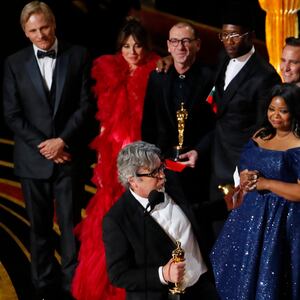“Do not turn that motherfucking clock on.”
That’s what TV audiences didn’t hear Spike Lee say after he bounded on stage, stopping to leap into the arms of longtime pal/collaborator Samuel L. Jackson, to accept the Best Adapted Screenplay Oscar for BlacKkKlansman.
The censors bleeped out the filmmaker’s demand to have his full say without interruption.
Who could blame him?
After all, he had waited years to deliver a victory speech, having been denied awards for Do the Right Thing and 4 Little Girls, or any nominations for Malcolm X. And he definitely had a message to deliver, reminding the audience that February is Black History Month and this year is the 400th anniversary of slavery.
“Our ancestors were stolen from Mother Africa and brought to Jamestown, Virginia, enslaved. Our ancestors worked the land from can’t see in the morning to can’t see at night,” he said.
He paid tribute to his grandmother, the daughter of a slave, who squirreled away her Social Security checks to put him through Morehouse College and NYU film school.
“Before the world tonight, I give praise to our ancestors who have built this country into what it is today,” he said.
Ending on a political note, Lee turned to the 2020 presidential election.
“Let’s all mobilize. Let’s all be on the right side of history,” he said.
“Make the moral choice between love versus hate,” he added, decked out in purple (a nod to Prince) and sporting the “Love” and “Hate” brass knuckles worn by the movie character Radio Raheem, played by the late Bill Nunn, in Do the Right Thing.
“Let’s do the right thing! You know I had to get that in there.”
Lee, who was awarded an honorary Oscar several years ago, was palpably joyful over winning his first-ever competitive Academy Award.
His movie missed out on two other top awards: The Best Director statuette went, as expected, to Roma’s Alfonso Cuaron; while Green Book, which has been criticized for racial tone-deafness, won Best Picture.
Asked about Green Book’s win backstage, Lee took a sip of champagne and said, “Next question.” But he couldn’t hold back completely. “I thought it was courtside at the Garden and the ref made a bad call,” he said.
“Every time somebody’s driving somebody, I lose... But they changed the seating arrangement?” he added.
It was a reference not only to Green Book, which is about a white chauffeur driving a black musician through the Deep South, but to Driving Miss Daisy, which won Best Picture in 1990—when Do the Right Thing was snubbed in the category.
Even though he made only one trip to the Oscar podium on Sunday night, Lee did have a second victory to celebrate. As Jackson informed him from the stage, “after 18 consecutive home losses, the Knicks won tonight.”
Now that is truly a miracle.







